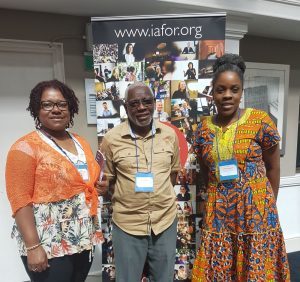I attended the European Conference on Arts & Humanities (ECAH), July 11th -12th 2017 held in Brighton. With the conference theme being “History, Story, Narrative”, the aim of the conference was exploring how best to write history, while we were spectators to the process of history, often, while being intimately situated within its impact and formations. Who gets to tell history if the issue is colonialism or class? How does geography, the power of place, intersect with history? What is the status of the personal story or narrative within the larger frame of events?
My presentation explored the use of narrative from qualitative research using multi-layered archival data and the need for liberatory narratives when the voices of people are silent in the paperwork. This is an original archival early narrative of Anna, an enslaved mulatto girl who lived in the eighteenth century and the extraordinary turn of events in which her life transformed from slavery to wealth. Within this period of sociohistory, black and mixed-heritage people were both enslaved and considered property or free with minimal rights and privileges. The power of wealth intersects with slavery, family, freedom, and mortality. The social sciences explore humanity and its relationship to the environment in which humans live, thus bringing into this narrative the anthropology and development of Caribbean British Jamaican society. The presentation focused on the life and relationships of eighteenth-century Jamaican-born Anna PW and her British colonial community. Her remarkable story, as an analytical case study, highlights a developed narrative embedded in her “lived experience”, however, her voice is absent from the paperwork. In the paper, I argued that narrative analysis represents an explorative method of unpicking and understanding those experiences, thus providing socio-moral education and the need for a liberatory narrative to give Anna a voice in those ‘lived experiences’. A liberatory narrative according to bell hooks (2002), engages the personal and the emotional as it depicts the history of slavery and reminds us of how little we know … particularly if all we know are the facts … “. In Anna’s case, all we have are the facts.
Anna’s story takes us from her enslaved birth in 1745 Jamaica, to her manumission by her white father who bequeathed her a substantial amount of property in Jamaica, Britain, and the USA. The narrative explores the legal lengths Anna’s father went to ensure her protection from a patriarchal, racist society including, the involvement of King George III and the Archbishop of Canterbury, all to ensure her wealth was secure when she married and had children. In addition, Anna’s uncle Robert, also bequeathed her his Jamaican properties making her possibly the richest black woman of her time.
I would like to take this opportunity to thank the International Academic Forum (iafor) for choosing me to present this paper, the BU Doctoral College, Santander for the award and the fantastic support I receive from my supervisors; professors Sara Ashencaen Crabtree, Jonathan Parker and Dr Hyun Joo Lim. Much respect to you all.

Melsia (left) with the UWI Trinidad & Tobago delegates











 Beyond Academia: Exploring Career Options for Early Career Researchers – Online Workshop
Beyond Academia: Exploring Career Options for Early Career Researchers – Online Workshop UKCGE Recognised Research Supervision Programme: Deadline Approaching
UKCGE Recognised Research Supervision Programme: Deadline Approaching SPROUT: From Sustainable Research to Sustainable Research Lives
SPROUT: From Sustainable Research to Sustainable Research Lives BRIAN upgrade and new look
BRIAN upgrade and new look Seeing the fruits of your labour in Bangladesh
Seeing the fruits of your labour in Bangladesh ECR Funding Open Call: Research Culture & Community Grant – Apply now
ECR Funding Open Call: Research Culture & Community Grant – Apply now ECR Funding Open Call: Research Culture & Community Grant – Application Deadline Friday 12 December
ECR Funding Open Call: Research Culture & Community Grant – Application Deadline Friday 12 December MSCA Postdoctoral Fellowships 2025 Call
MSCA Postdoctoral Fellowships 2025 Call ERC Advanced Grant 2025 Webinar
ERC Advanced Grant 2025 Webinar Update on UKRO services
Update on UKRO services European research project exploring use of ‘virtual twins’ to better manage metabolic associated fatty liver disease
European research project exploring use of ‘virtual twins’ to better manage metabolic associated fatty liver disease